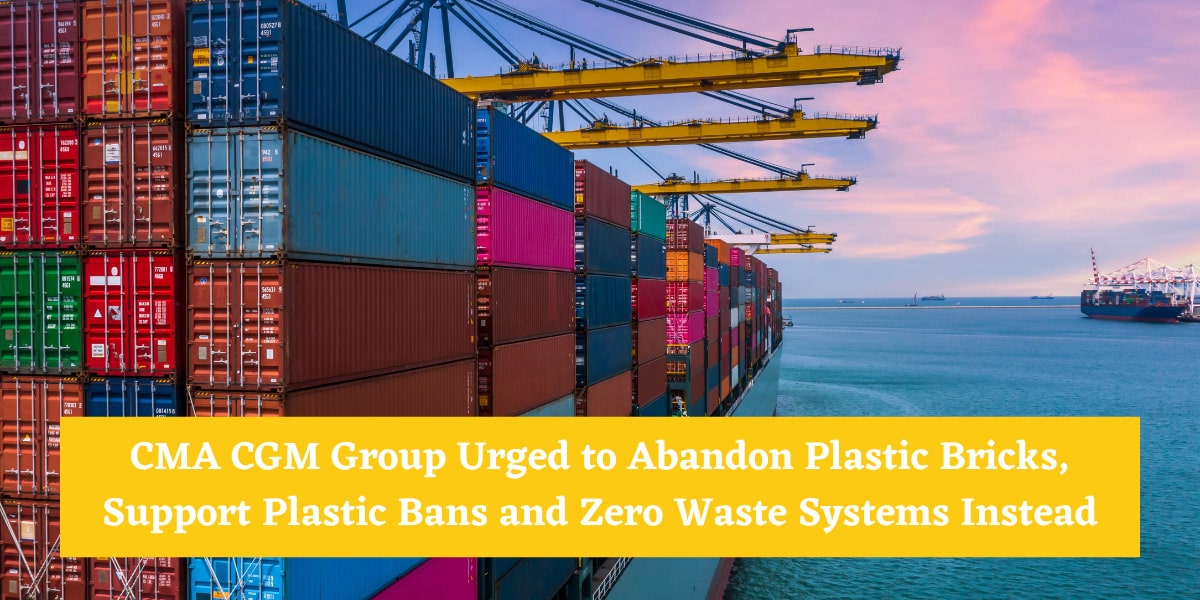On 15 September 2022, CMA CGM renewed their three-year partnership with the Plastic Flamingo (PLAF) to continue production of construction materials made from plastic sachet waste and riverine plastics. This partnership pledges to tackle river and land-based plastic pollution, yet investing in plastic bricks, planks, and boards is a step in the wrong direction.
Downcycling, whether this involves transforming plastic waste into alternate materials, is simply a distraction from pursuing real solutions, such as significantly reducing plastic production, particularly of sachets and other single-use plastics. Once transformed into plastic bricks or roads or even school chairs, the products cannot be further recycled and will likely end up in landfills or burned in incinerators at the end of their life cycle.
Coleen Salamat, Ecowaste, Philippines:
“Plastic bricks or roads, in addition, can lead to leaching of microplastics and hazardous chemicals, especially when exposed to heat and ultraviolet light. Recent studies have shown evidence of micro and nano plastics at the bottom part of lungs and even in blood. Microplastics and chemicals like cadmium can make their way into the soil and affect agricultural productivity, and also reach waterways where they threaten aquatic plant and animal life."
In the Philippines, downcycled plastic materials are also touted as solutions to two very real problems: a shortage of shelters for its burgeoning population; and landfills of low-quality, non-recyclable plastic waste exported by the West. However, downcycled material is unsuitable for load-bearing structures, and any contamination from food waste or organic materials can result in methane, which eventually breaks down the material. In some cases, eco-bricks also pose a fire hazard. Downcycled materials cannot address the cause of plastic pollution - indiscriminate production, consumption and disposal.
In April 2022, the CMA CGM Group wrote a letter to its customers, announcing that it will no longer carry plastic waste on its ships, effective June 1. The landmark decision was in response to a call from the Basel Action Network (BAN), The Last Beach Cleanup, and 50 other organisations for major shipping lines to stop transporting plastic waste to countries that do not have adequate capacity to handle such discards safely. In importing countries, local recyclers often have limited capacity in terms of handling both domestic and imported plastic waste. Moreover, these countries increasingly rely on co-incinerating plastic waste, regardless of origin, in cement kilns.
Marian Ledesma, Greenpeace Philippines:
"CMA CGM took one step forward but regressed two steps back. Earlier this year, they made a laudable commitment to stop shipping plastic waste to support the fight against plastic waste trade. But now they're helping justify the continued proliferation of plastic waste with their partnership with Plastic Flamingo.
Converting plastic waste into construction materials justifies continued production and dependence on single-use plastics and does not prevent systemic harms caused by the plastic industry during production, including health risks from potential exposure to microplastics and toxic chemicals. CMA CGM should stop supporting such schemes and instead promote upstream solutions that will allow communities to shift away from plastics to reuse."
In an earlier statement, the CMA CGM group also committed to “prevent(ing) this type of waste from being exported to destinations where sorting, recycling or recovery cannot be assured." This demonstrates the company’s commitment to continue CSR initiatives to protect the environment, conserve biodiversity, and develop trade that is more responsible and fair for everyone and for the planet.
To this end, we urge the CMA CGM Group to abandon downcycling projects and instead support single-use plastic regulations in countries where they are operating. For CSR projects, they can also consider investing in Zero Waste programs, which aim to minimise municipal waste streams, and help local governments save money, reduce waste generation and create jobs. There are BETTER WAYS to address plastic pollution, we urge you to choose wisely.
Press Contact:
- Asia & the Pacific: Eah Antonio, Eah@breakfreefromplastic.org
About Break Free From Plastic – #breakfreefromplastic is a global movement envisioning a future free from plastic pollution. Since its launch in 2016, more than 2,500 organizations representing millions of supporters around the world have joined the movement to demand massive reductions in single-use plastics and push for lasting solutions to the plastic pollution crisis. BFFP member organizations and individuals share the shared values of environmental protection and social justice and work together through a holistic approach to bring about systemic change. This means tackling plastic pollution across the whole plastics value chain—from extraction to disposal—focusing on prevention rather than cure and providing effective solutions. www.breakfreefromplastic.org




